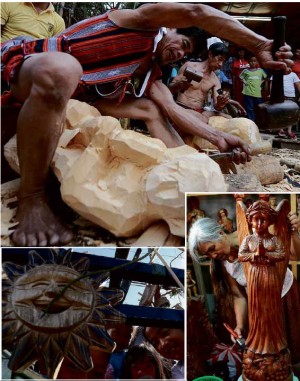Preserving the forests and Ifugao art

IFUGAO artisans helped create a village of artists more than 50 years ago on Asin Road in Tuba town, Benguet province. PHOTOS BY EV ESPIRITU
After World War II, a group of Ifugao wood-carvers migrated to Benguet province and set up shops on Asin Road in Barangay Tadiangan, Tuba town, near Baguio City.
American soldiers still occupied Camp John Hay at the time and the market for hand-carved items had started to rise. This became a fairly reasonable incentive for the hardy sculptors to leave their mountain villages.
Few would recognize that story today. Baguio residents only remember Asin Road as the neighboring community on which the city’s old dump collapsed in 2011.
Manila tourists know the area because of a museum built by National Artist Bencab (Ben Cabrera), who is also a Tuba migrant.
Festival of creation
Article continues after this advertisementOn May 22, the wood-carving families, that now include the grandchildren of the original carvers, pooled their resources to put up the Pa-ot Festival along Asin Road to draw attention back to what they do best: Create.
Article continues after this advertisementWith friends and neighbors like Bencab, the residents danced in the street wearing or wielding their art: hand-carved fertility statuettes that form a necklace and spears and shields that are carefully shaped by artisan tools.
Bul-ol (Ifugao mythical granary guardians) of various sizes were also put out on display. Some merrymakers rode on wooden scooters, which became a trademark artifact in Ifugao province during its Imbayah Festival, a thanksgiving feast that is mounted every three years.
Every home displayed other wooden sculptures: carabao, lions, deers and even carvings of Ifugao men biting into pipes.
The festival, after all, honors the traditional skills of the old Asin Munpa-ot (carvers), which were brought to Singko (Km 5 on Asin Road) by five migrants from the Ifugao towns of Hungduan and Banaue in the late 1940s.
Martin Udan, one of the original carvers, used to earn a living by carving out giant forks and spoons that became popular souvenir items for American soldiers assigned to Camp John Hay, said his daughter Remedios Andrada.
Andrada said the carvers soon experimented with shapes, as American customers began commissioning them to produce new statues. So they created statues of American Indians, Ifugao hunters, elephants and even the Buddha.
The trade, however, suffered when the government began controlling the use of pine and other wood products. In 2011, President Aquino issued Executive Order No. 23, which banned all forms of logging. This cut off the wood supply needed by the wood-carvers, said Grace Marie Quilas, chair of the Pa-ot Festival.
Village culture
“The total log ban accelerated the erosion of Ifugao carving here. Wood-carving is a village culture. The elders work side by side with their apprentices, usually their grandchildren. Younger villagers watch on the side, learning the craft by observation and, later, practice,” Quilas said.
The present generation no longer went through this process of apprenticeship, so Andrada has petitioned the Department of Education to allow her to introduce wood-carving as part of the curriculum of Joaquin Smith National High School in Km 4 where she serves as principal. About 75 percent of students there are Ifugao descendants, she said.
Rovilyn Mayat-an, owner of Mayat-an Handicrafts, said there were customers who prefer to buy art that does not lead to the destruction of the environment.
“I joined the festival not to advocate a return to the old ways but to seek new materials to replace wood so that we, carvers, do not reduce our forest cover,” she said.
The Pa-ot Festival celebrates the traditional carver but it is also the venue “to lead the trade away from activities that sacrifice the environment,” she said.
The festival showcased a giant fiberglass statue of comic book hero Hulk that was manufactured in Pangasinan province by Asin carver Joel Buyagao.
Buyagao said fiberglass work was but an evolution of their craft.